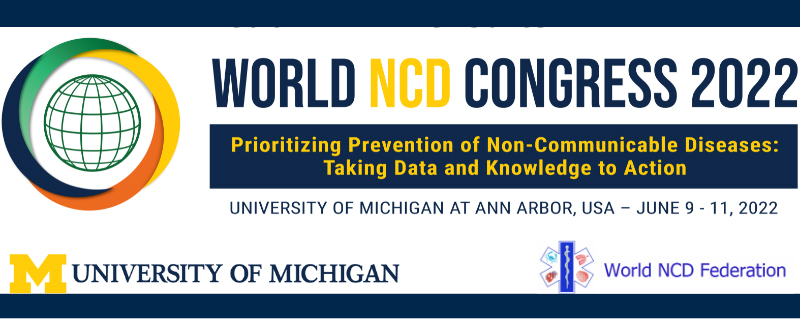
Aimed across multiple disciplines and sectors, the World NCD Congress 2022 will run June 9-11 and will feature speakers from India, China, Finland, Central America, Caribbean, US, UK, and more. Originally scheduled to take place in-person in the summer of 2020, the revised event is virtual and will highlight the importance of prioritizing upstream prevention – leveraging learning systems and a multisectoral approach – in tackling the rising global impact of chronic diseases. Registration is free.
“The pandemic has been a stark reminder of the vital importance of prevention, given COVID’s devastating impact on those already weakened by underlying chronic diseases,” said Professor of Internal Medicine and Epidemiology Rajiv Saran, the conference’s chief organizer and Chair. “Through this event, we wish to spark a conversation around the critical need for more root-cause approaches to preventing disease and disability.”
Prominent speakers include WHO’s Chief Scientist, Soumya Swaminathan, Pekka Puska, Finland’s former Director General of the National Institute for Health and Welfare, Dariush Mozaffarian, Friedman School of Nutrition Science & Policy, as well as Michigan Medicine Professor of Internal Medicine Rodica Pop-Busui, who is the incoming President of the American Diabetes Association.
There are planned sessions on Learning Systems and Surveillance, Role of Artificial Intelligence in Early Detection, Health Inequities, Metabolic diseases, Chronic Kidney Disease, Childhood Obesity, role of Environmental Factors (air pollution, warming climate, occupational settings) and more, with panelists from many Michigan Medicine departments and School of Public Health as well as School of Information, as well guests from Stanford University, the University of Arizona, India’s KMCH Research Foundation, and others.
“As a world-class institution with expertise that cuts across all aspects of health and healthcare, U-M is a natural setting to host this conference,” Saran said. “I am grateful partners and colleagues at U-M and around the world who worked diligently through delays and uncertainty to make this important conference possible. Without their commitment, it could not have happened.”
